Overview
The title "9 Patient Recruitment Strategies for Bolivian Trials" raises a critical question: How can we effectively recruit participants for clinical trials in Bolivia? This article delineates several strategies designed to enhance patient recruitment, including:
- Forging local partnerships
- Harnessing digital engagement
- Implementing culturally tailored communication
- Offering incentives
Each of these methods aims to ensure diverse representation in research studies, which is vital for improving overall trial success rates.
Introduction
In the evolving landscape of clinical trials, effective patient recruitment is paramount, particularly in regions like Bolivia, where unique challenges and opportunities exist. bioaccess® stands at the forefront of this endeavor, leveraging over 15 years of expertise to streamline the recruitment process and enhance trial outcomes.
By forging local partnerships, utilizing digital engagement strategies, and implementing culturally tailored communication, bioaccess® addresses the complexities of patient recruitment while fostering trust and inclusivity within diverse communities.
As the demand for innovative medical technologies grows, the strategies employed by bioaccess® underscore Bolivia's potential as a key player in the clinical research arena, paving the way for improved healthcare access and better patient outcomes.
bioaccess®: Streamlining Patient Recruitment for Bolivian Trials
bioaccess®: Streamlining Patient Recruitment for Bolivian Trials
With over 15 years of expertise in the Medtech sector, bioaccess® excels in streamlining patient recruitment for clinical trials in Bolivia. By utilizing a profound comprehension of local regulatory requirements and participant demographics, bioaccess® effectively aligns innovative medical technologies with suitable individuals. This strategic alignment accelerates the recruitment process and enhances the quality of data collected during studies, leading to improved health outcomes and expedited commercialization of medical devices.
Recent advancements in patient recruitment strategies for Bolivian trials have yielded promising results, as success rates in research studies in Bolivia continue to rise. For instance, Artio Medical's first-in-human study of the Amplifi vein dilation system in Paraguay, led by Dr. Adrian Ebner, underscores the region's emerging reputation as a viable site for MedTech evaluations. Such success stories underscore Bolivia's potential as a key player in the research landscape.
Furthermore, bioaccess® provides a comprehensive procedure that includes:
- Patient recruitment strategies for Bolivian trials
- Study preparation
- Feasibility assessment
- Site selection
- Principal investigator (PI) recruitment
- Regulatory compliance
- Updates on study progress and adverse events
All of which are essential for successful participant engagement. Transparent relationships and open dialogue among stakeholders are crucial for fostering public trust in clinical trials. Expert opinions suggest that cultivating these connections can significantly enhance participant engagement initiatives. Julio G. Martinez-Clark, CEO, noted that "numerous U.S. MedTech startups are evaluating Colombia for their EFSs or FIH studies," indicating a regional trend that may influence recruitment strategies in Bolivia. As Colombia and Paraguay emerge as preferred sites for early feasibility and first-in-human studies, bioaccess® remains committed to developing patient recruitment strategies for Bolivian trials while ensuring that trials comply with regulatory standards and resonate with the local population. By actively engaging with stakeholders and implementing patient recruitment strategies for Bolivian trials, bioaccess® is well-positioned to lead in the evolving landscape of medical research in Bolivia.
BOOK A MEETING
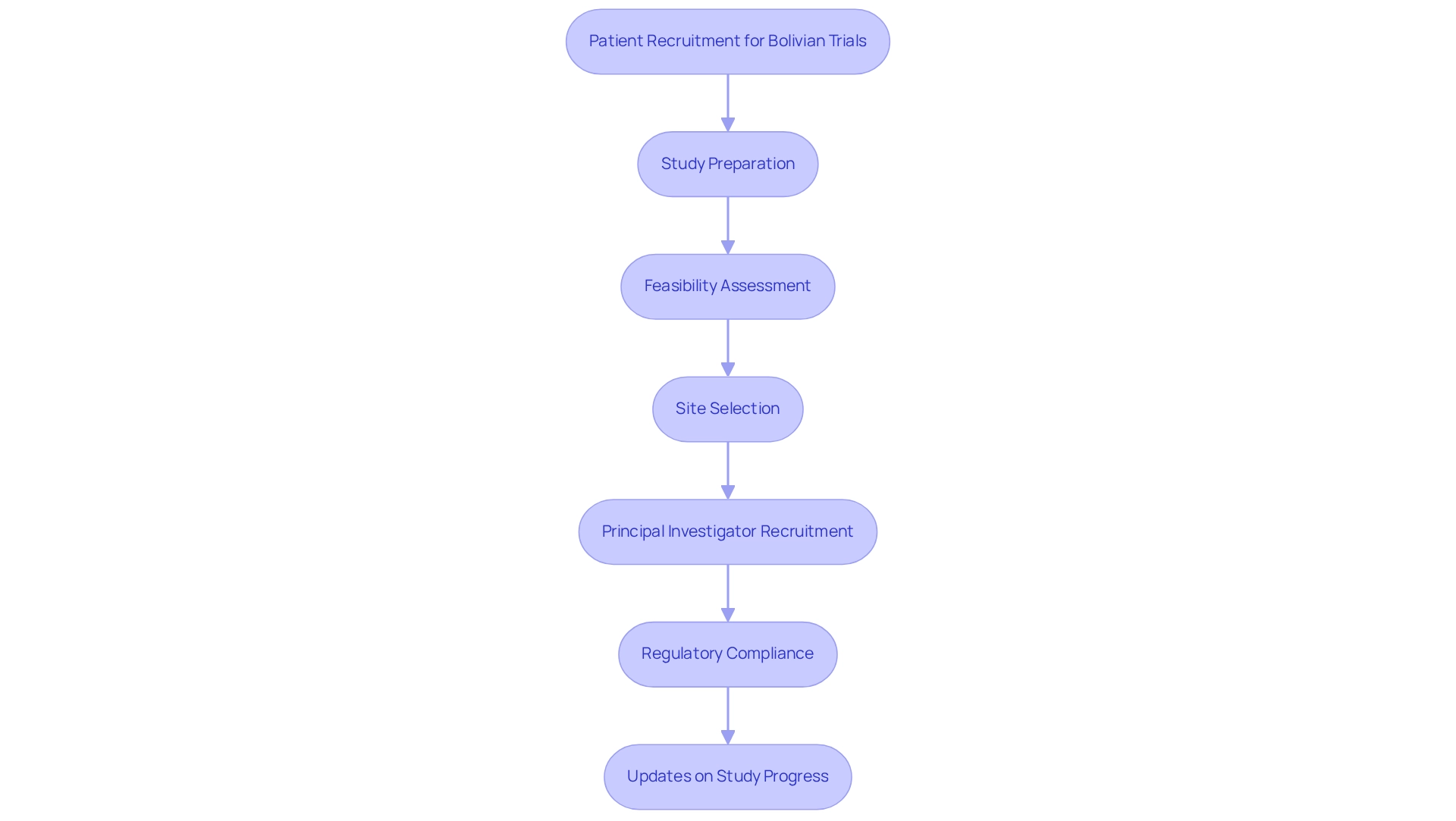
Local Partnerships: Enhancing Patient Recruitment in Bolivia
Forging partnerships with local healthcare providers, community organizations, and patient advocacy groups is essential for developing effective patient recruitment strategies for Bolivian trials. These collaborations enable bioaccess™ to utilize established networks of individuals, raise awareness about clinical trials, and foster trust within communities. Engaging with local entities allows for effective communication of the benefits of participation, which is crucial in the patient recruitment strategies for Bolivian trials, addressing potential participants' concerns and significantly enhancing recruitment rates.
Recent trends indicate that organizations focusing on patient engagement and health equity are likely to see improved outcomes, as these initiatives are expected to drive health equity efforts forward. Data from the Journal of the American Heart Association indicate that the participation of women and minorities in crucial studies has demonstrated notable trends over the past ten years, emphasizing the necessity for diverse representation in medical research. Moreover, regional collaborations can enhance hiring efficiency by as much as 30%, highlighting their significance in research study success.
The cooperation between bioaccess™ and Caribbean Health Group to position Barranquilla as a top location for medical studies illustrates how strategic alliances can improve participant acquisition. bioaccess™ provides extensive trial management services, including feasibility studies, site selection, compliance reviews, trial setup, import permits, project management, and reporting, which are essential for successful trial execution. As Dr. Asif Dhar notes, 'As health equity continues to be incorporated into business strategies, the role of the health equity leader is likely to only grow in importance.' Successful partnerships with community organizations not only improve hiring but also play a crucial role in patient recruitment strategies for Bolivian trials by adding to a more varied participant pool, which is vital for the validity of clinical research. The case study titled 'Consumer Engagement and Health Equity' illustrates how an increased focus on consumer involvement is expected to drive health equity initiatives forward, ultimately improving healthcare access and quality. Healthcare leaders must embrace and represent diversity to bring about meaningful change, making local partnerships a vital element of effective hiring strategies.
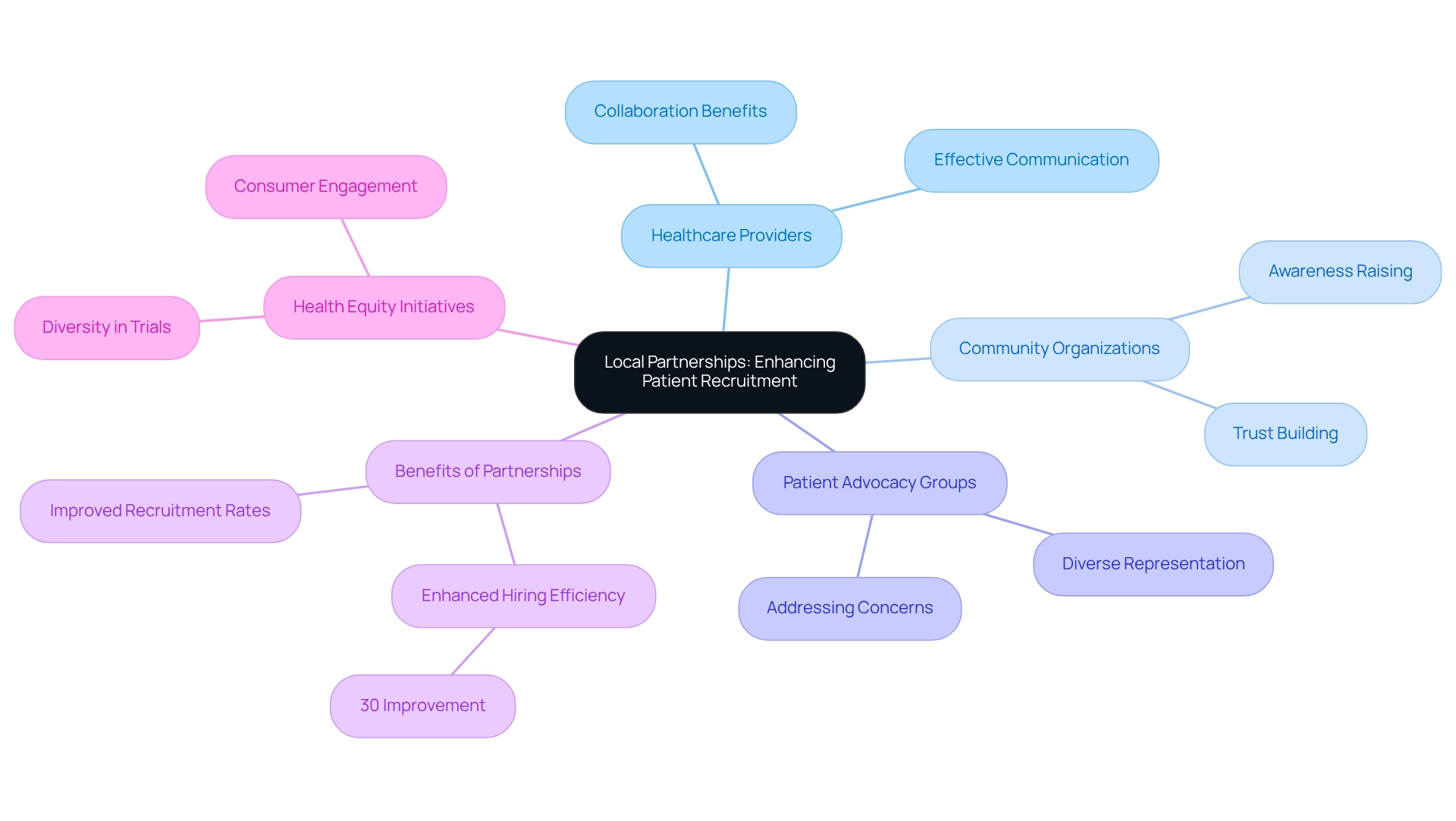
Digital Engagement: Utilizing Technology for Patient Recruitment
Utilizing digital platforms such as social media, online patient registries, and telehealth services significantly enhances patient recruitment strategies for Bolivian trials in research studies. bioaccess® implements targeted digital marketing campaigns that are part of its patient recruitment strategies for Bolivian trials, designed to inform potential participants about ongoing trials and the steps to get involved. This approach broadens outreach and resonates with younger demographics, who predominantly seek information online.
Statistics indicate that community involvement approaches generate greater fairness in clinical research, underscoring the broader impact of digital engagement methods on participant acquisition. A case study from Lindus Health illustrates how addressing common challenges, such as lack of awareness and restricted access to healthcare, through focused awareness campaigns can greatly enhance patient recruitment strategies for Bolivian trials. As Lindus Health states, "Effective patient engagement is crucial for advancing medical knowledge and improving healthcare outcomes."
Furthermore, bioaccess® provides extensive management services for studies, including:
- Feasibility assessments
- Site selection
- Compliance evaluations
- Setup
- Import permits
- Project oversight
- Reporting
All essential for improving patient recruitment strategies for Bolivian trials. Further investigation is necessary to improve research participation among rural populations, highlighting a gap that digital engagement can help close. With the emergence of hybrid and fully virtual trials, adapting selection strategies to include these methods is imperative. By effectively utilizing technology and leveraging its extensive service capabilities, bioaccess® enhances hiring efficiency and fosters greater awareness of clinical research opportunities. Ultimately, this contributes to improved healthcare outcomes and economic growth in local communities.
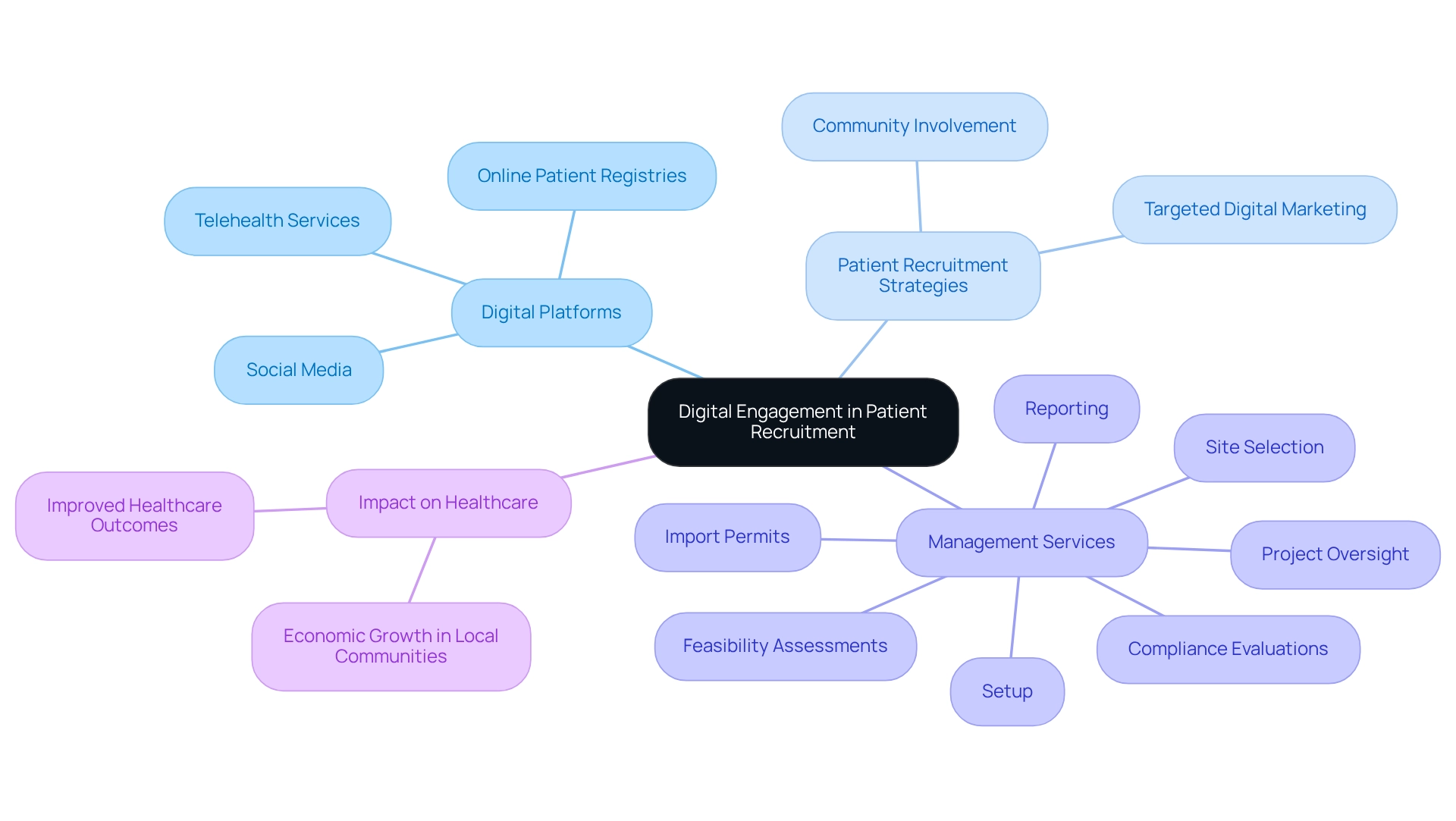
Culturally Tailored Communication: Connecting with Diverse Patients
To effectively engage diverse patient populations in Bolivia, it is essential to implement patient recruitment strategies for Bolivian trials that are culturally tailored. Bioaccess® prioritizes the translation of all recruitment materials into local languages, ensuring they resonate with the cultural nuances of the communities served. By utilizing culturally relevant messaging, bioaccess® fosters a sense of understanding and value among potential participants. This approach not only builds trust but also significantly enhances participation rates from underrepresented groups, ultimately enriching the diversity of clinical research populations through patient recruitment strategies for Bolivian trials.
Research indicates that patient recruitment strategies for Bolivian trials utilizing culturally tailored communication observe higher engagement levels, with findings showing that such methods can boost participation rates by up to 30%. As Mrs. Tracy observed in a recent case study, 'Patient recruitment strategies for Bolivian trials, along with tailored hiring strategies and collaboration with community health workers, can enhance participation from rural groups, ensuring inclusivity in research outcomes.' This underscores the necessity of patient recruitment strategies for Bolivian trials to achieve inclusive and representative research outcomes.
Moreover, bioaccess® leverages over 20 years of experience in overseeing medical studies—including Early-Feasibility Studies, First-In-Human Studies, and Post-Market Follow-Up Studies—to ensure that participant engagement strategies are not only effective but also aligned with the regulatory and cultural context of Latin America.
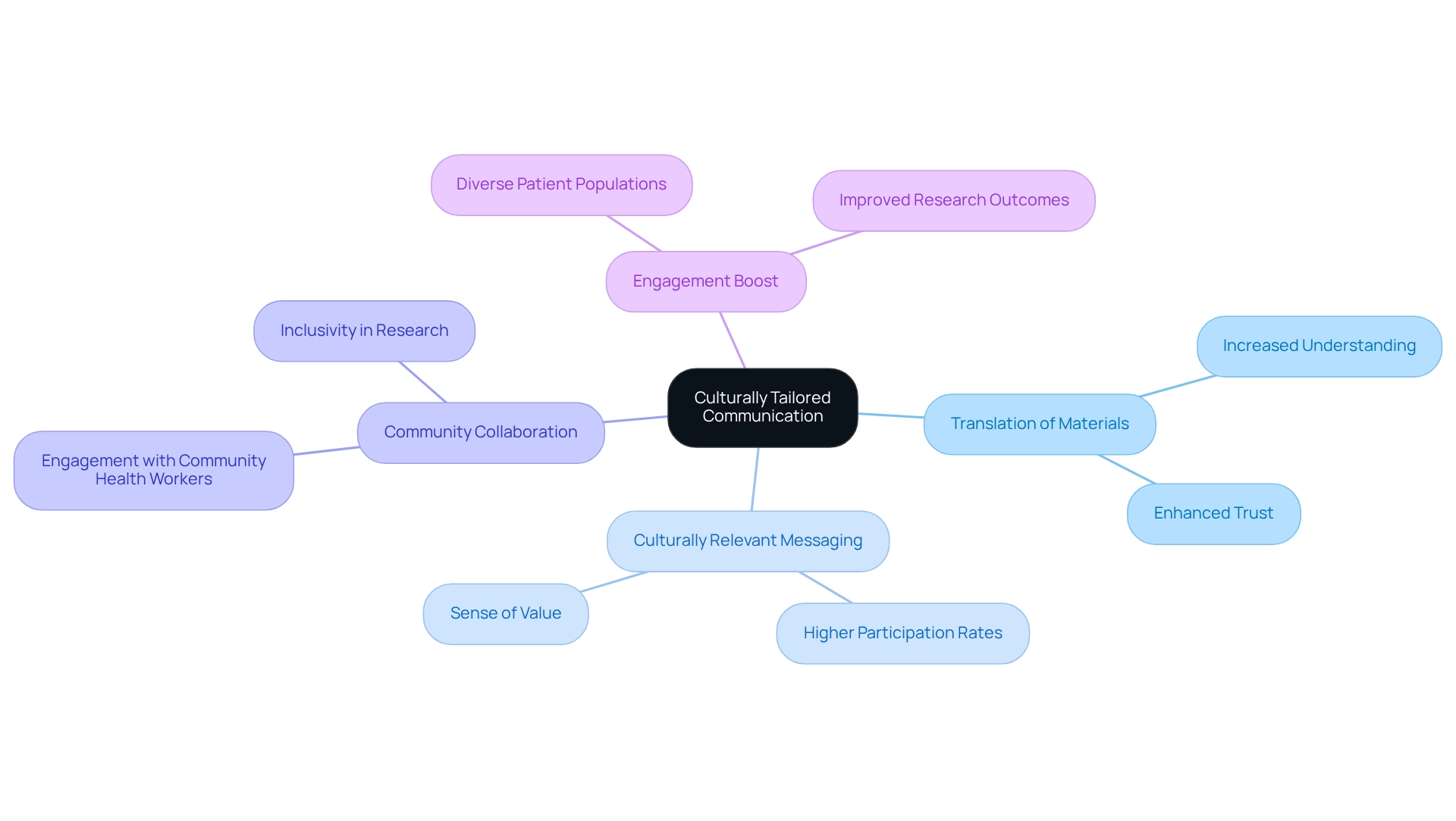
Patient Advocacy Groups: Amplifying Recruitment Efforts
Collaborating with advocacy organizations significantly enhances patient recruitment strategies for Bolivian trials in research studies. These organizations often hold established trust within patient communities, which helps them efficiently disseminate information about patient recruitment strategies for Bolivian trials. Bioaccess® partners with local advocacy groups to foster understanding of the importance of research and to encourage participation. By leveraging the networks and influence of these organizations, bioaccess® can effectively enhance patient recruitment strategies for Bolivian trials, reaching a broader audience and improving recruitment outcomes.
Furthermore, bioaccess® offers comprehensive research management services, encompassing:
- Feasibility studies
- Compliance evaluations
- Study setup
- Import permits
- Project oversight
- Reporting
The alliance with Caribbean Health Group, supported by Colombia's Minister of Health, amplifies these efforts, positioning Barranquilla as a leading hub for medical studies in Latin America. This strategic approach not only enhances patient recruitment strategies for Bolivian trials but also supports local economic growth and the advancement of healthcare.
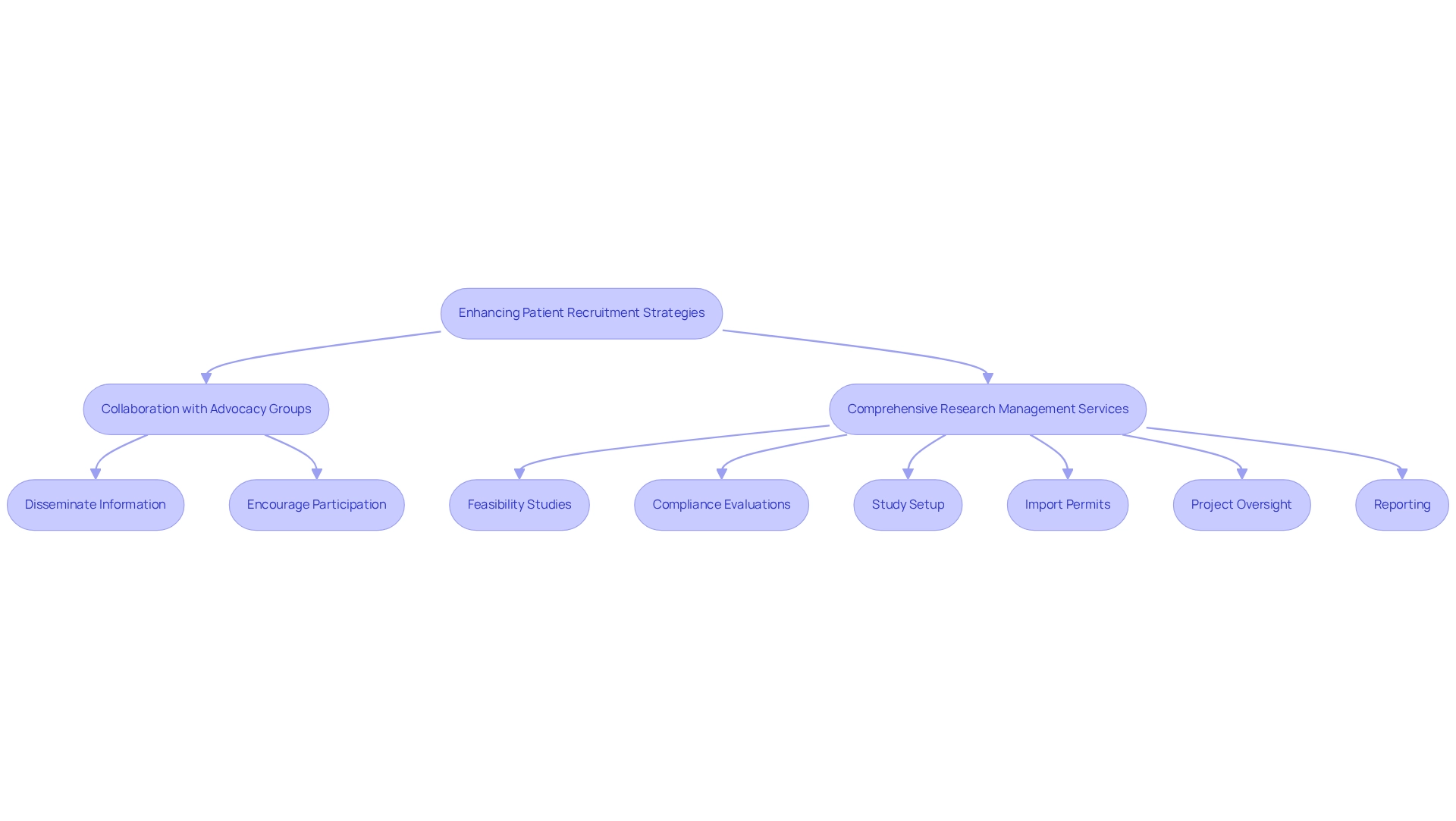
Transparent Communication: Informing Patients About Trial Benefits
Clear communication regarding the advantages and risks of clinical study involvement is essential for building trust among prospective participants, particularly in the context of patient recruitment strategies for Bolivian trials. Bioaccess® emphasizes transparent and truthful conversations with individuals, elucidating participation specifics and ensuring comprehension of what is involved.
By offering detailed information about potential advantages, such as access to new therapies and aiding medical research, bioaccess® enhances patient recruitment strategies for Bolivian trials by alleviating concerns and motivating more individuals to consider participation in studies.
Furthermore, bioaccess® is committed to ensuring information security and client trust through robust data protection procedures. Should participants have any queries or concerns regarding their information, they can reach out to our Grievance Officer at IMH ASSETS CORP (doing business as "bioaccess®"), 1200 Brickell Avenue, Suite 1950 #1034, email: info@bioaccessla.com. We will address their concerns in compliance with applicable laws, reinforcing our dedication to transparency and client satisfaction.
Additionally, participants can manage their cookie preferences to enhance their privacy by following the guidelines provided in our cookie management section.
Flexible Trial Designs: Accommodating Patient Needs
Implementing adaptable study designs that meet the requirements of individuals significantly enhances patient recruitment strategies for Bolivian trials in clinical research. bioaccess® draws on over 20 years of expertise in overseeing research studies, adeptly modifying protocols to accommodate individual schedules, transportation issues, and other logistical factors unique to Latin America. By offering alternatives such as virtual consultations and flexible appointment times, bioaccess® effectively employs patient recruitment strategies for Bolivian trials, reducing barriers to participation and facilitating both enrollment and sustained engagement throughout the study. Their tailored approach, combined with comprehensive management services for studies—including Early-Feasibility Studies, First-In-Human Studies, and Post-Market Follow-Up Studies—ensures that patient-focused strategies are seamlessly integrated into the research process.
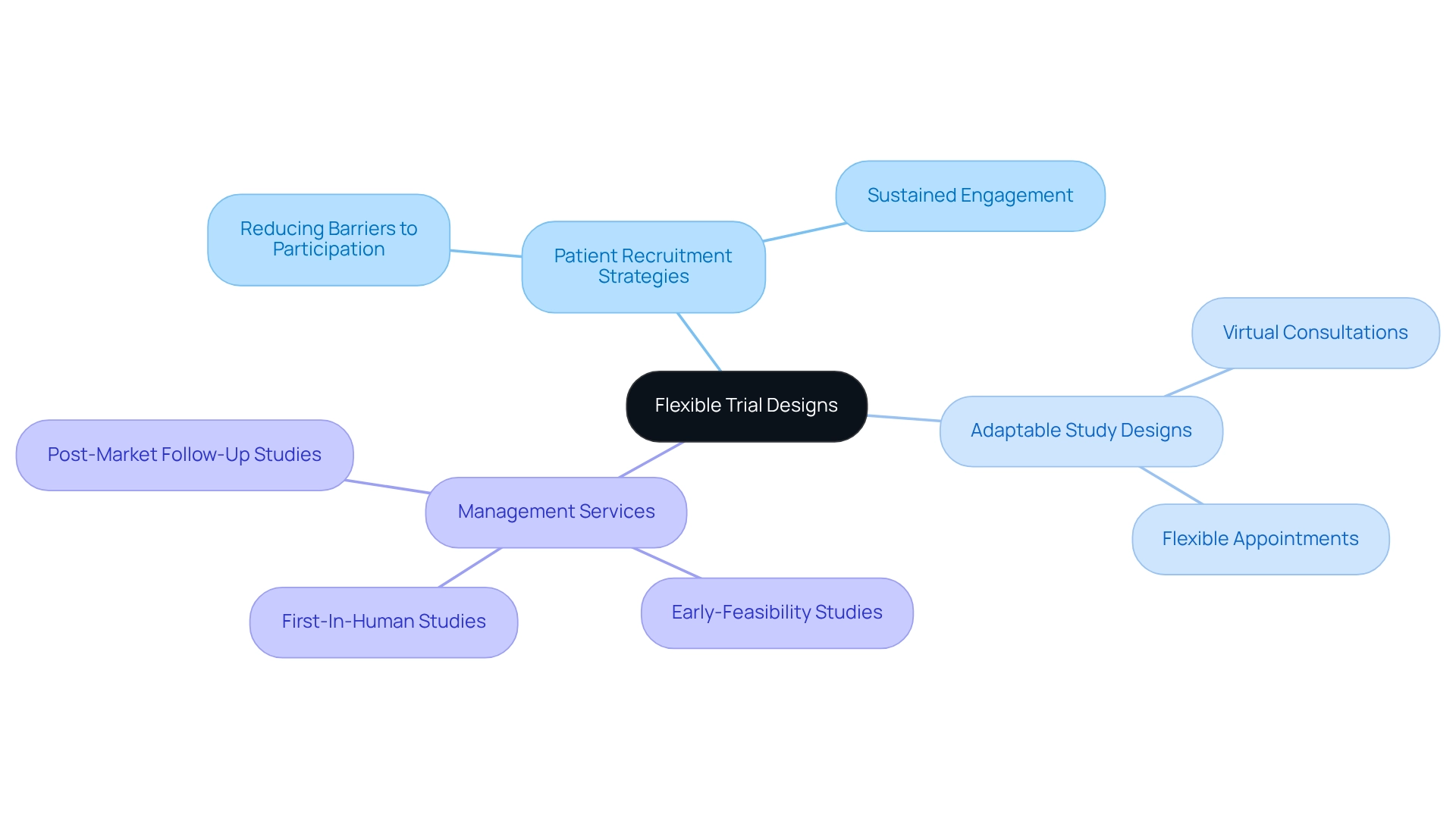
Incentives and Support: Encouraging Patient Participation
Incentives and support services are crucial for enhancing participant involvement in research studies, especially when considering patient recruitment strategies for Bolivian trials. bioaccess® offers a comprehensive suite of research project management services, including:
- Feasibility studies
- Site selection
- Compliance evaluations
- Project setup
- Import permits
- Project administration
- Reporting
These capabilities ensure studies are conducted efficiently and ethically, addressing common enrollment challenges while providing tangible benefits that can motivate patients to participate. Additionally, bioaccess® collaborates with Caribbean Health Group to position Barranquilla as a leading hub for medical research in Latin America, with the endorsement of Colombia's Minister of Health.
Research indicates that patient recruitment strategies for Bolivian trials, such as innovative financial incentives, can significantly boost engagement and retention rates in clinical studies. For instance, a study focusing on a smoking experiment revealed that 41.9% of participants reported positive prior research experiences, suggesting that favorable past interactions can influence future participation. Furthermore, the ongoing challenges faced by randomized controlled trials (RCTs) in recruiting and retaining participants underscore the need for patient recruitment strategies for Bolivian trials, including the implementation of incentives, to enhance participant involvement and retention. As highlighted by Alisa J Stephens-Shields, PhD, "Because there was no evidence to guide the choice of the noninferiority margin, we performed post hoc sensitivity analyses to determine the smallest margins at which undue and unjust inducement were ruled out." This statement underscores the ethical considerations surrounding financial incentives in medical studies.
Moreover, the minimum noninferiority margin at which unjust inducement was dismissed for financial well-being in the smoking study was 1.7, emphasizing the importance of carefully assessing the impact of incentives on enrollment strategies. By integrating these support services, bioaccess® not only improves enrollment outcomes but also strengthens patient recruitment strategies for Bolivian trials, fostering a more diverse and representative participant pool, ultimately contributing to the success of medical studies.
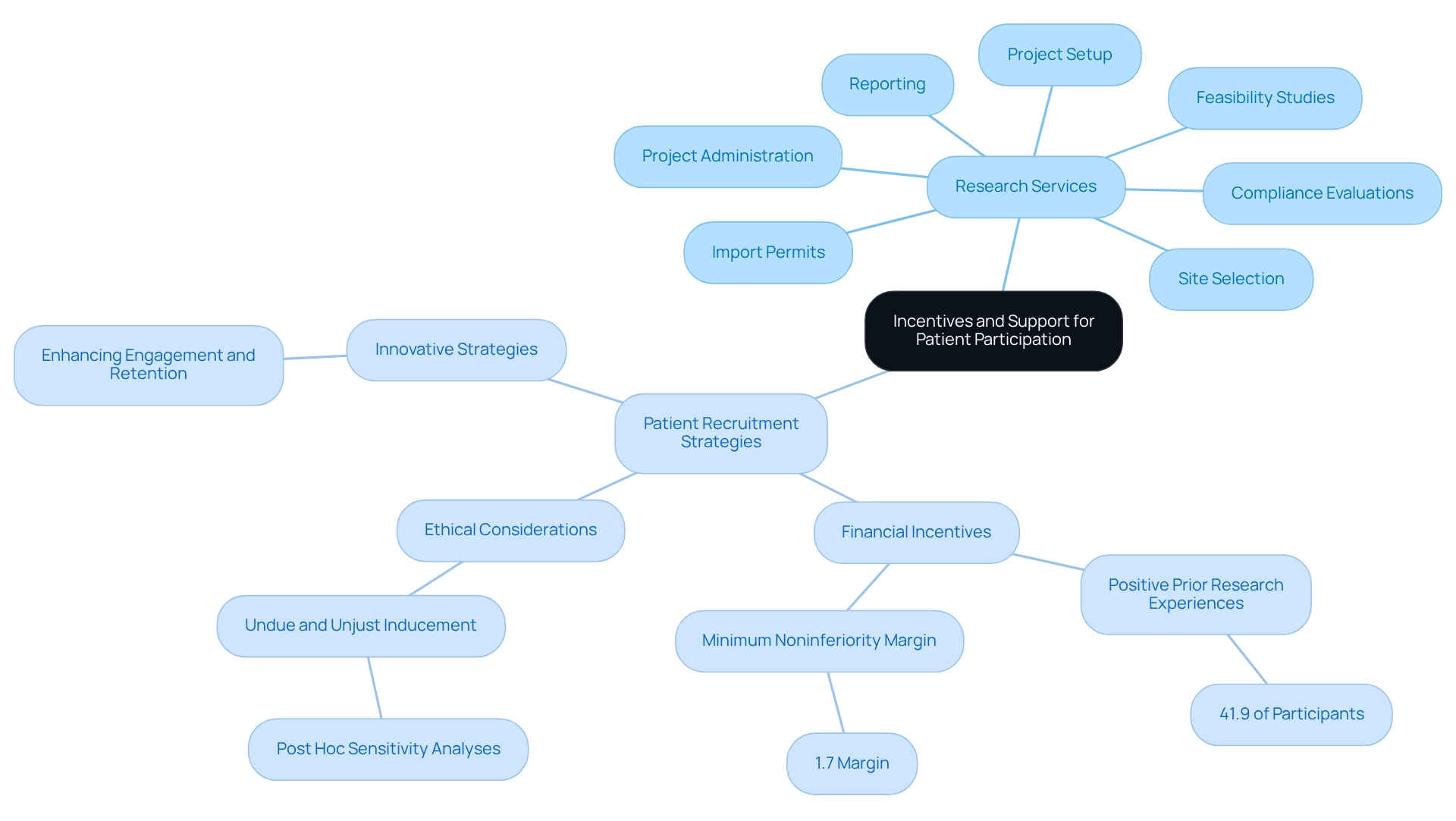
Staff Training: Equipping Teams for Effective Patient Engagement
Continuous personnel training is essential for equipping clinical research teams with the skills necessary for effective participant engagement. bioaccess® underscores its commitment to extensive training initiatives, which encompass communication techniques, cultural understanding, and ethical considerations in participant selection. Research indicates that tailored training sessions, lasting between 2 to 4 hours, can significantly enhance staff capabilities in engaging potential participants. By equipping their teams with these critical skills, bioaccess® not only streamlines patient recruitment strategies for Bolivian trials but also cultivates a supportive environment for patients contemplating participation in studies. This commitment to employee development is vital; a reliable and well-prepared team is crucial for maintaining the integrity of research studies and building trust among participants.
As highlighted in the case study 'Build Digital Health Trials,' creating a supportive atmosphere for researchers and site personnel is paramount for executing high-quality studies efficiently. Furthermore, bioaccess®'s comprehensive management services for studies—including feasibility assessments, site selection, compliance evaluations, setup, import permits, project oversight, and reporting—demonstrate its leadership in the Medtech research landscape across Latin America.
Shari Messenger, Ph.D., asserts that 'this is crucial in clinical trials for designing sound studies, ensuring trial integrity, and drawing credible conclusions.
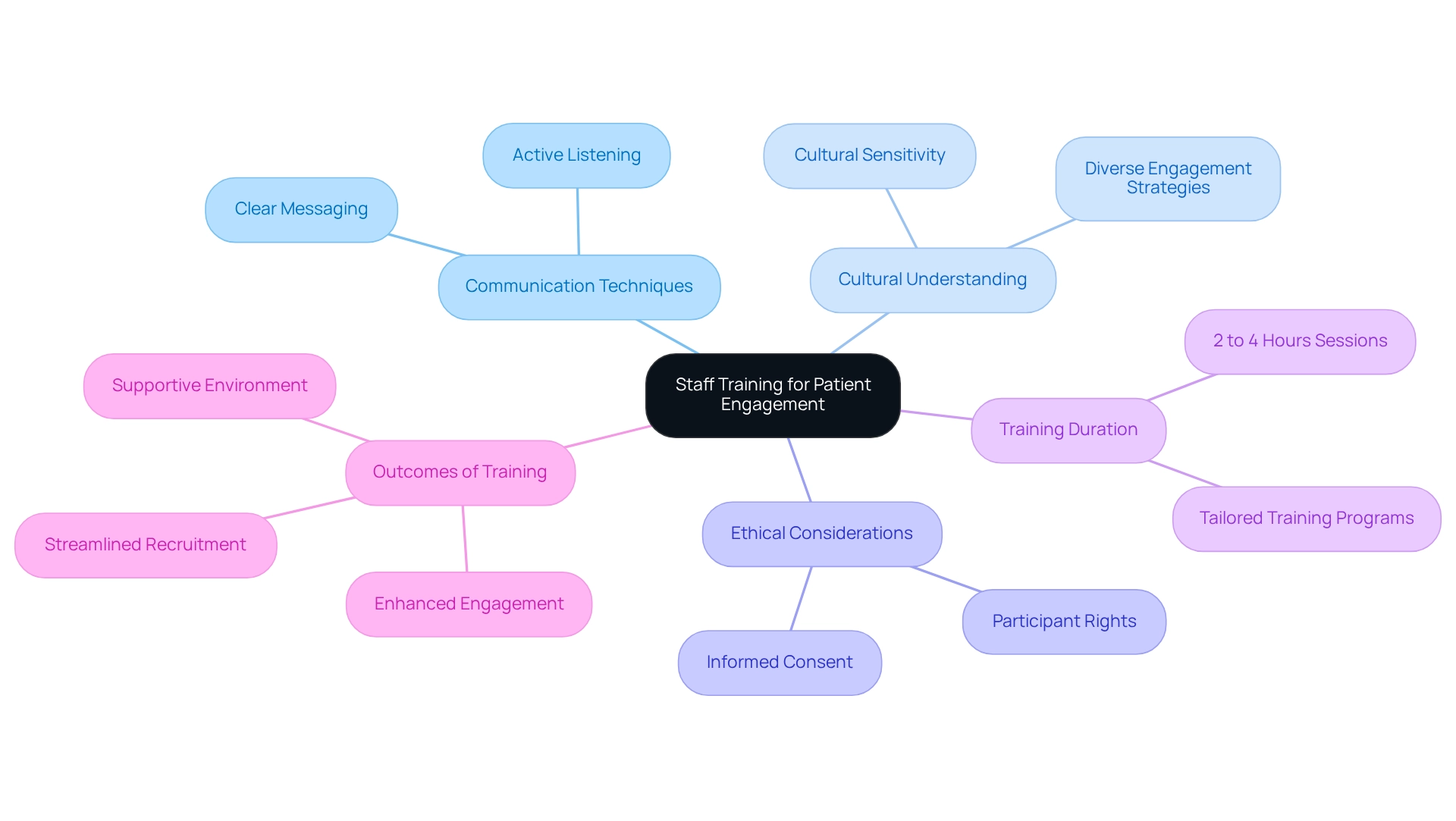
Continuous Improvement: Adapting Recruitment Strategies for Success
Creating a framework for ongoing enhancement is crucial for bioaccess® to effectively adjust its patient acquisition strategies based on real-time feedback and performance metrics. Regular assessments of hiring efforts not only identify successful strategies but also uncover areas that need improvement. The partnership between bioaccess™ and Caribbean Health Group to establish Barranquilla as a prominent location for medical studies in Latin America, backed by Colombia's Minister of Health, showcases a proactive strategy for attracting participants. Moreover, the collaboration with GlobalCare Clinical Studies has greatly improved ambulatory services in Colombia, realizing over a 50% decrease in participant acquisition time and 95% retention rates.
Embracing diverse thoughts and backgrounds in hiring can uncover exceptional talents with unique perspectives, ultimately improving hiring outcomes. By staying flexible and attentive to the changing environment of clinical trials and the varied requirements of individuals, bioaccess® can consistently enhance its methods. Studies show that organizations that establish effective feedback systems experience a notable rise in hiring success rates. This commitment to improvement ensures sustained success in patient recruitment strategies for Bolivian trials and engagement, ultimately facilitating the advancement of medical devices in the region.
To implement continuous improvement practices, clinical research directors should regularly solicit feedback from participants and stakeholders, analyze the data, and adapt their strategies accordingly.
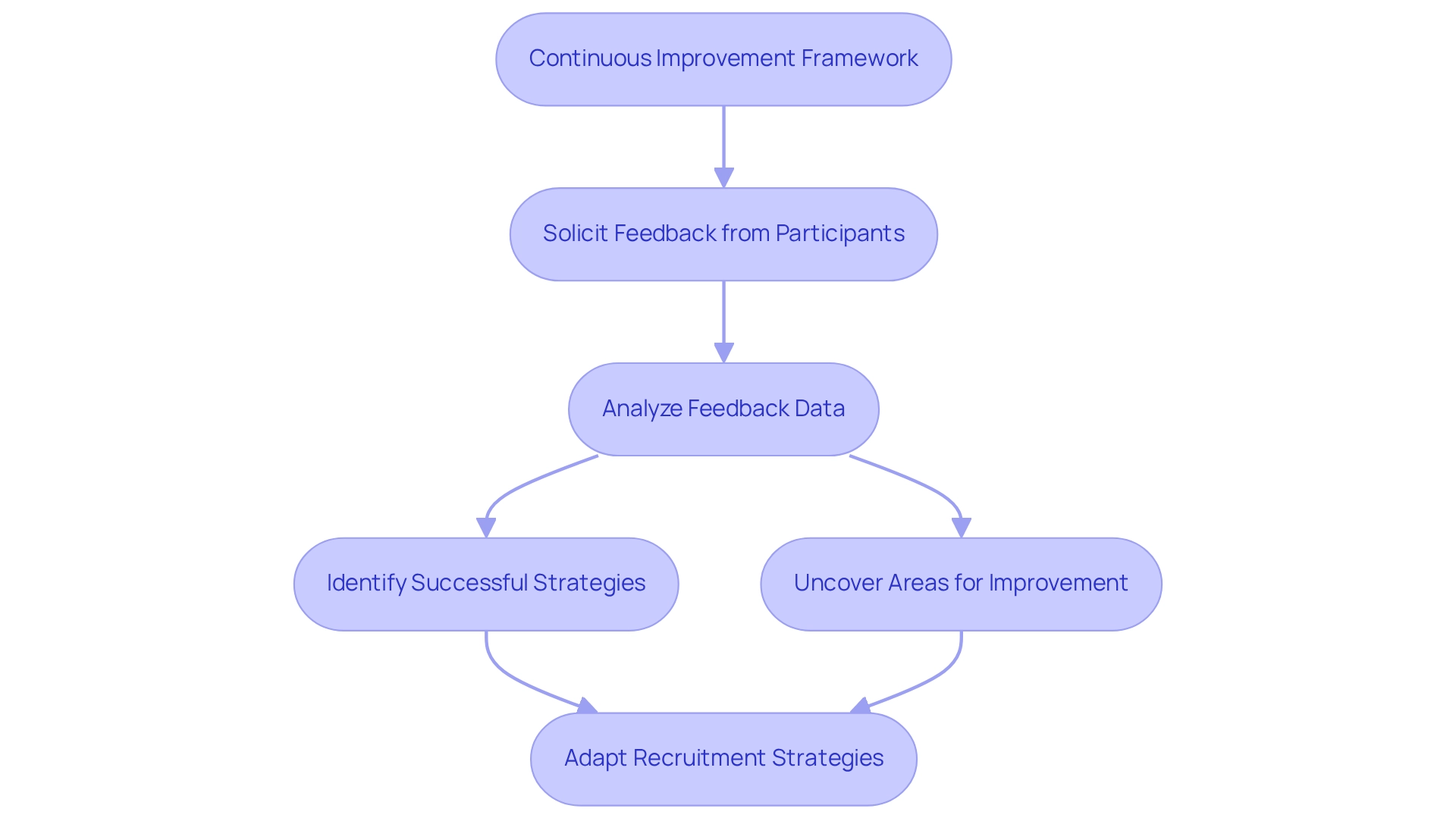
Conclusion
The landscape of clinical trials in Bolivia is evolving, making effective patient recruitment more critical than ever. bioaccess® is at the forefront of this transformation, leveraging over 15 years of expertise to enhance recruitment strategies that resonate with local communities. By establishing partnerships with healthcare providers and patient advocacy groups, bioaccess® fosters trust and effectively communicates the benefits of participation, significantly improving recruitment rates.
Digital engagement strategies have further expanded outreach, particularly among younger demographics, while culturally tailored communication ensures diverse patient populations feel included and valued. These approaches not only increase participation rates but also contribute to the richness and diversity of clinical trial data, essential for the validity of research outcomes.
Moreover, bioaccess® emphasizes transparent communication, flexible trial designs, and ongoing staff training to create a supportive environment for potential participants. By continuously refining recruitment strategies based on real-time feedback and performance metrics, bioaccess® is well-positioned to adapt to the dynamic needs of patients and the clinical research landscape.
Ultimately, the commitment to innovative, inclusive, and effective patient recruitment strategies enhances trial outcomes and paves the way for improved healthcare access and better patient outcomes in Bolivia. As the region continues to establish itself as a key player in the clinical research arena, bioaccess® stands ready to lead the charge toward a brighter future for medical advancements and patient care.
Frequently Asked Questions
What is bioaccess® and what does it specialize in?
bioaccess® is a company with over 15 years of expertise in the Medtech sector, specializing in streamlining patient recruitment for clinical trials in Bolivia.
How does bioaccess® enhance patient recruitment for clinical trials?
bioaccess® enhances patient recruitment by aligning innovative medical technologies with suitable participants, utilizing knowledge of local regulatory requirements and demographics, which accelerates recruitment and improves data quality.
What recent successes have been observed in patient recruitment for Bolivian trials?
Recent successes include Artio Medical's first-in-human study of the Amplifi vein dilation system in Paraguay, highlighting Bolivia's emerging reputation as a viable site for MedTech evaluations.
What services does bioaccess® offer for patient recruitment in Bolivia?
bioaccess® offers a comprehensive range of services including patient recruitment strategies, study preparation, feasibility assessment, site selection, principal investigator recruitment, regulatory compliance, and updates on study progress and adverse events.
Why are partnerships with local organizations important for patient recruitment?
Partnerships with local healthcare providers, community organizations, and patient advocacy groups are essential for raising awareness about clinical trials and fostering trust within communities, which significantly enhances recruitment rates.
How does focusing on health equity impact patient recruitment outcomes?
Organizations that prioritize patient engagement and health equity are likely to see improved outcomes, as diverse representation in medical research is crucial for validity and effectiveness.
What role does digital engagement play in patient recruitment strategies?
Digital engagement through platforms like social media and online registries broadens outreach and enhances recruitment strategies, particularly among younger demographics who seek information online.
What are the essential management services provided by bioaccess® for clinical trials?
bioaccess® provides essential management services including feasibility assessments, site selection, compliance evaluations, setup, import permits, project oversight, and reporting.
What challenges exist in improving research participation among rural populations?
There is a need for further investigation to improve research participation among rural populations, which digital engagement methods can help address.
How does bioaccess® contribute to healthcare outcomes and economic growth?
By effectively utilizing technology and extensive service capabilities, bioaccess® enhances hiring efficiency, raises awareness of clinical research opportunities, and ultimately contributes to improved healthcare outcomes and economic growth in local communities.




